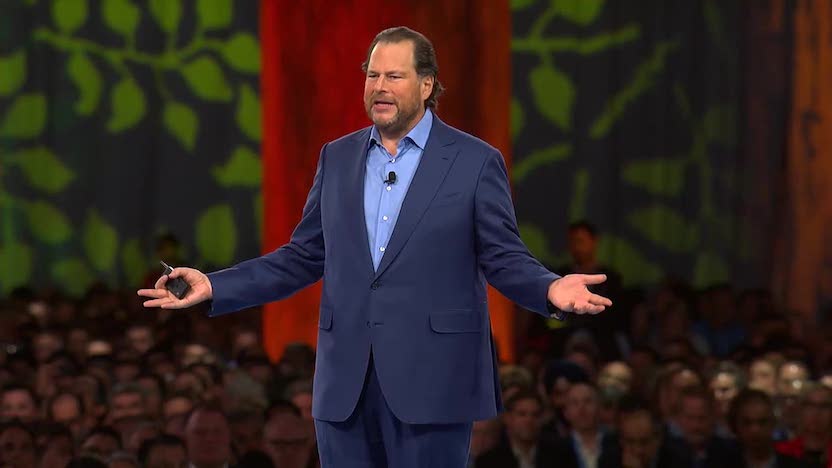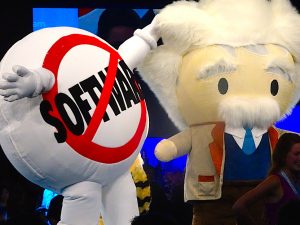 CLOUD
CLOUD
 CLOUD
CLOUD
 CLOUD
CLOUD
When Salesforce.com Inc. unveiled its new artificial intelligence platform in September of last year, the company chose a small, cartoonish figure with a bushy mustache and mop of unruly white hair to symbolize the most recent addition to its portfolio. At Dreamforce, the major annual conference held this week in San Francisco by the customer relationship management powerhouse, Einstein is easily the smallest of the characters, which include big bears and mountain goats, all prominently displayed around the convention center venue in keeping with an outdoorsy, “Trailblazer” theme.
Appearances lie. Einstein is actually 10 feet tall when it comes to the company’s products and future. That was apparent in the dialogue from various breakout sessions, announcements and keynote remarks from Chief Executive Marc Benioff (pictured).
And there were hints that Salesforce could be sitting on a major breakthrough of its own in AI and deep learning, the method of enabling computers to learn on their own that has led to breakthroughs in image and speech recognition. “We know that AI is the future of all of our applications and software,” Benioff declared Monday.
Before Benioff even took the stage on Monday afternoon, Salesforce released the news that it had formed a partnership with Google which will integrate the search giant’s Analytics 360 service with Salesforce products to track advertising and sales. In return, Salesforce will add Google Cloud to its partner portfolio, giving Google a much-desired boost in the enterprise computing space.
“We’re deeply integrating Google analytics into Salesforce,” said Benioff, who curiously did not have much else to say in his keynote about the major announcement. Neither did Diane Greene, the legendary founder of VMware and now CEO of Google Cloud, who was on hand for the occasion.
The somewhat muted positioning of the Google news — Benioff spent more time at his keynote bantering with the head of the Adidas shoe company than he did with Greene — may stem from a desire to promote Einstein and not overshadow the company’s major AI bet. However, on Tuesday Benioff added a long fireside chat with Greene to emphasize the companies’ joint interest in making their respective massive data troves more useful to their overlapping customer bases.
Monday’s keynotes and a deeper dive during several sessions on Tuesday underscored Salesforce’s commitment to its AI strategy. The company announced myEinstein, its layer of AI across the Salesforce cloud platforms. The “my” branding is part of the company’s move this year to let users customize platform capabilities.
Salesforce users will now have two new AI tools – Prediction Builder and Einstein Bots – that can be applied to various applications. Models for structured and unstructured data can be created in a point-and-click dashboard using Prediction Builder, and Einstein Bots facilitates the creation of a user’s own bot to answer questions or easily locate data. John Ball, senior vice president of product and general manager of Einstein, said the company was now delivering 475 million predictions daily.
“We deliver AI declaratively, with clicks not code,” said Stephanie Buscemi, executive vice president of product marketing at Salesforce.
 At the core of Einstein Bots is a natural language processing function that understands a customer’s text communications and can draw from Salesforce’s vast database of customer encounters. This function did not spring from a research and development lab deep inside the Salesforce structure. It arrived as part of the company’s acquisition of the startup MetaMind in April of 2016.
At the core of Einstein Bots is a natural language processing function that understands a customer’s text communications and can draw from Salesforce’s vast database of customer encounters. This function did not spring from a research and development lab deep inside the Salesforce structure. It arrived as part of the company’s acquisition of the startup MetaMind in April of 2016.
The founder of MetaMind and now chief scientist at Salesforce – Richard Socher – delivered a brief presentation during an Einstein keynote session on Tuesday. Socher revealed during his remarks that a deep learning algorithm can now generate long sequences of coherent text and that Salesforce has significantly advanced the cause of natural language processing.
“We now have internally one of the most accurate machine translation systems in the world,” Socher said.
Salesforce’s chief scientist was a noteworthy hire when the company quietly acquired his deep learning startup last year. Ten years ago, Socher was a member of the team at Princeton that created ImageNet, the large database of images which became the foundation for computer vision research. He went on to earn a doctorate at Stanford, studying under the tutelage of Andrew Ng, the AI pioneer who was instrumental in building machine learning platforms for Baidu and Google.
“Complete natural language understanding is pretty complicated, but we are making progress,” Socher said.
With these purported advances in AI development, there is still a question around how all of this translates into results for enterprise companies or nonprofit organizations. On Tuesday, Salesforce devoted a significant portion of its Einstein keynote session to stories about customers who have been integrating AI into business models.
U.S. Bancorp has been using Einstein to analyze 4.5 million leads and deliver predictive factors that could lead to sales conversion for various financial products. One insight gleaned from the process was that customers who held a mortgage with the bank were more likely to purchase additional products if they were offered a bank-branded credit card.
“The purpose of AI is to enable a human being to be a human being and build a deeper relationship,” said Bill Hoffman, chief analytics officer at U.S. Bank, during Tuesday’s session. The tool had more than doubled lead conversion from the previous process, according to Hoffman.
In the nonprofit world, College Forward is using Einstein to help students from underserved backgrounds get to and through college. The group employs coaches who use Salesforce to log and track every interaction with a student. Einstein’s language processing feature analyzes the written remarks, which could include concerns about a troubled living situation, and delivers predictive warnings that the student could soon drop out of school.
“Data management has become a key value of our organization,” said Austin Buchan, CEO of College Forward, who described how his group previously relied on 27 Excel spreadsheets and Google Docs to track the same information.
By customizing Einstein and expanding low-code development, a method of creating applications through aggregating functions rather than hand-coding them, Salesforce is clearly pursuing a strategy to take AI out of the lab and democratize its use. The approach is very much in keeping with the company’s holistic approach to the tech world in general, creating a big tent where a robot that thinks for us and analyzes everything we say or do is no more a threat than a box of cornflakes.
“This technology has never been good or bad,” Benioff said as he strode the convention center aisles in San Francisco on Monday. “It’s what we do with technology that matters.”
THANK YOU